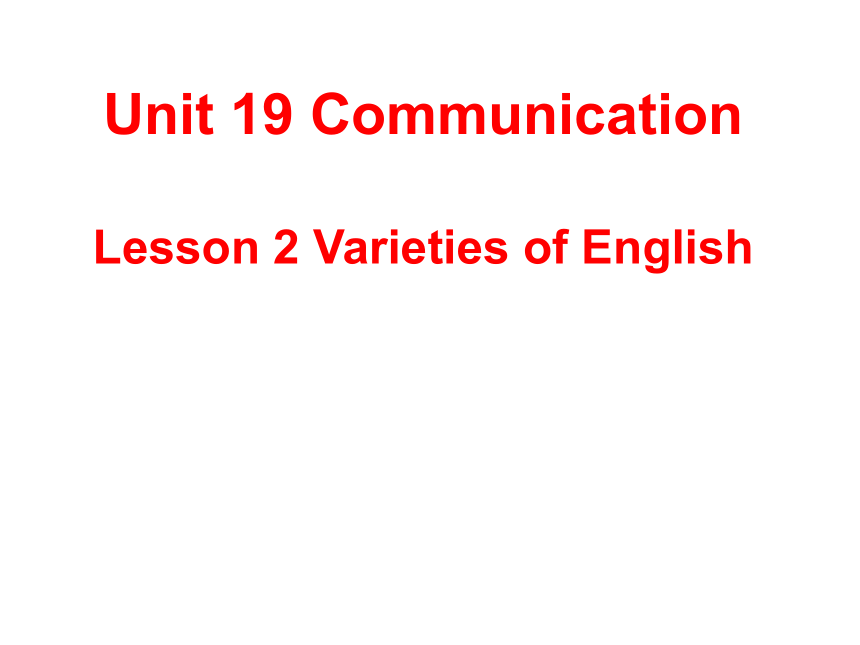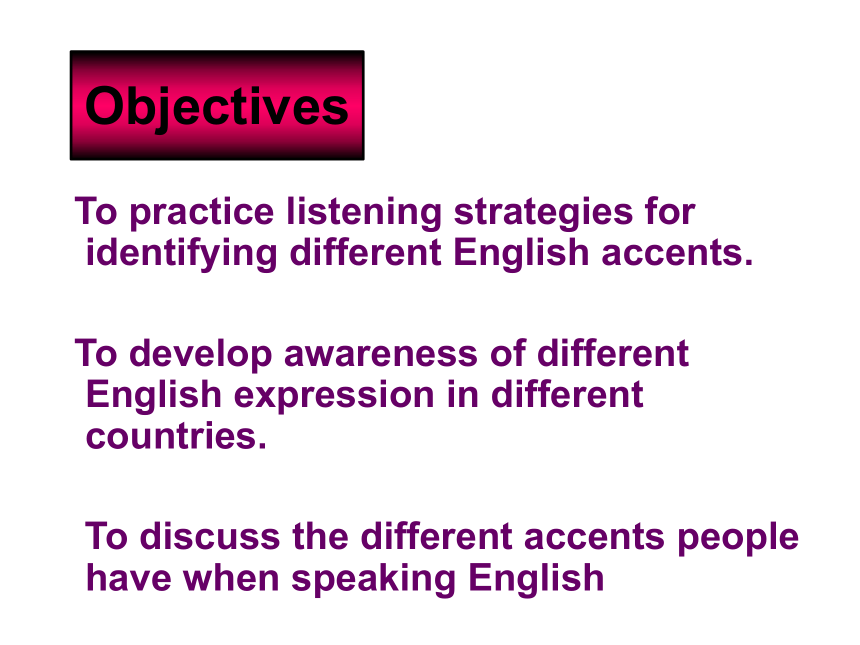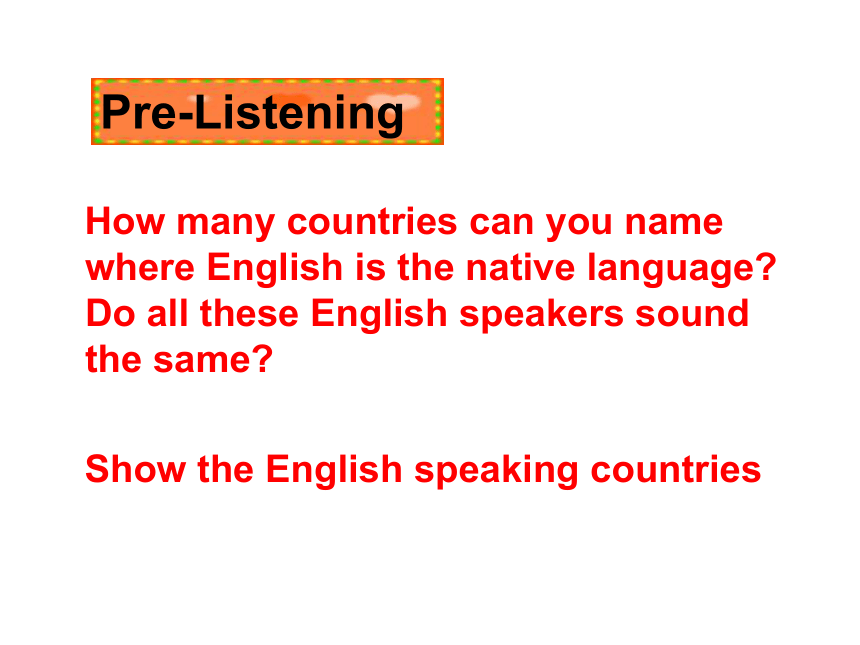英语高二下北师大版Unit19《Language》(Lesson 2)课件1
文档属性
| 名称 | 英语高二下北师大版Unit19《Language》(Lesson 2)课件1 |  | |
| 格式 | zip | ||
| 文件大小 | 341.6KB | ||
| 资源类型 | 教案 | ||
| 版本资源 | 北师大版 | ||
| 科目 | 英语 | ||
| 更新时间 | 2013-03-29 15:20:11 | ||
图片预览









文档简介
课件27张PPT。Unit 19 CommunicationLesson 2 Varieties of English
To practice listening strategies for identifying different English accents.
To develop awareness of different English expression in different countries.
To discuss the different accents people have when speaking EnglishObjectives
How many countries can you name where English is the native language? Do all these English speakers sound the same?
Show the English speaking countriesPre-Listening Britain The United States Australia New Zealand Canada Ireland South Africa JamaicaLook at the key words. Match them to words with the same meaning in the list below. (Exercise 2)Flat, film, post, rubbish, pavement, subway
1 mail
2 movie
3 sidewalk
4 trash
5 apartment
6 undergroundFlatpostfilmsubwaypavementrubbishDiscussion (Exercise 3) What do you think makes the Key Words different from the words in the list? Listen to the dialogue and decide if these statements are true (T) or false (F). Exercise 4 Listening1 Pam is America.
2 Robert comes from Australia.
3 The more different accents you hear the more
confused you get.
4 Richard has an Australian English accent.’
5 Pam and Robert say “classroom” the same way.FTFFTListen again and answer the following question (Exercise 5) Why do you think Liang weimin thought all English speakers sounded like BBC World Service reporters?Suggested answer
He probably learns English by listening to
BBC World Service broadcasting and has
Never heard any others English accent.Exercise 6 Listen to the sentences and decide whether they are spoken in an American accent (A) or a British accent (B) Can you identify a rule for the difference in the American and British pronunciation of the sound 〔a:〕.1 Would you like a glass of water?
2 She’s dancing in the classroom.
3 Let me give you an example.
4 I like to eat tomatoes.ABABExercise 7 Now listen to these sentences and decide whether they are spoken in an Australian accent or a British accent.Can you identify a rule for the difference in the Australian and British pronunciation of the sound 〔ei〕.1 Did you say you are going sailing this weekend?
2 I am going on a date this Saturday!
3 How much did you pay for your rollerblades?
4 The mail always comes on Tuesday.
5 What did you say when he was late?
6 Sorry I am late. I had to pay my bills.AustralianBritishAustralianAustralianBritishBritishListen to the conversation and decide which speaker is American, which is British and which is Australian. (Exercise 8)★★★Exercise 9 Listen to the Canadian travel dialogues. Use the Strategies to choose the correct alternative for each dialogue. There is one extra answer.1 where are the people?
a) in a tourist information office
b) in a hotel c) at the observation dome
d) at the travel agent’s 2 Who is talking?
a) a tourist and a trainee
b) a receptionist and a hotel guest
c) a passenger and the Tour Manager
d) two passengers
3 What are they talking about?
a) a tour around the city
b) a delay c) stopping off somewhere
d) the city’s buildings
4 How do the tourists feel?
a) nervous b) frustrated
c) happy d) tired Exercise 10 Listen again and use these expressions to complete the Function File Would it be possible, Could you, I’m sorry but, I was wondering if, Do you think I could, Will you be, I’d prefer not, I’m afraid, Is it all right if, If you’d like, Could you possibly, I wonder ifPolite Requests1 to fill in this form here, please.
2 I know this is unusual, but after the long flight to go on with the group.
I just go off on my own
a bit later?
she won’t be here till about ten o’clock.
5 having lunch in the hotel, sir?
6 give me a map of the city, please? If you’d likeI’d prefer notIs it all right ifWill you beCould you possiblyI’m afraid you could give me information about visiting some of the buildings in Toronto, please?
8 have something about the modern buildings, please?
9 ask someone else, please?
10 I could ask you something?
11 to stay over an extra night in Winnipeg?
12 we have to keep to the timetable, sir.
Do you think I couldI’m sorry butCould youI was wondering ifWould it be possibleI wonder ifSpeaking Work in pairs. Student A and Student B turn to page 103. Then make a dialogue according to the situations.Homework Read the Culture Corner on page 16 to learn more about the English around the world.
To practice listening strategies for identifying different English accents.
To develop awareness of different English expression in different countries.
To discuss the different accents people have when speaking EnglishObjectives
How many countries can you name where English is the native language? Do all these English speakers sound the same?
Show the English speaking countriesPre-Listening Britain The United States Australia New Zealand Canada Ireland South Africa JamaicaLook at the key words. Match them to words with the same meaning in the list below. (Exercise 2)Flat, film, post, rubbish, pavement, subway
1 mail
2 movie
3 sidewalk
4 trash
5 apartment
6 undergroundFlatpostfilmsubwaypavementrubbishDiscussion (Exercise 3) What do you think makes the Key Words different from the words in the list? Listen to the dialogue and decide if these statements are true (T) or false (F). Exercise 4 Listening1 Pam is America.
2 Robert comes from Australia.
3 The more different accents you hear the more
confused you get.
4 Richard has an Australian English accent.’
5 Pam and Robert say “classroom” the same way.FTFFTListen again and answer the following question (Exercise 5) Why do you think Liang weimin thought all English speakers sounded like BBC World Service reporters?Suggested answer
He probably learns English by listening to
BBC World Service broadcasting and has
Never heard any others English accent.Exercise 6 Listen to the sentences and decide whether they are spoken in an American accent (A) or a British accent (B) Can you identify a rule for the difference in the American and British pronunciation of the sound 〔a:〕.1 Would you like a glass of water?
2 She’s dancing in the classroom.
3 Let me give you an example.
4 I like to eat tomatoes.ABABExercise 7 Now listen to these sentences and decide whether they are spoken in an Australian accent or a British accent.Can you identify a rule for the difference in the Australian and British pronunciation of the sound 〔ei〕.1 Did you say you are going sailing this weekend?
2 I am going on a date this Saturday!
3 How much did you pay for your rollerblades?
4 The mail always comes on Tuesday.
5 What did you say when he was late?
6 Sorry I am late. I had to pay my bills.AustralianBritishAustralianAustralianBritishBritishListen to the conversation and decide which speaker is American, which is British and which is Australian. (Exercise 8)★★★Exercise 9 Listen to the Canadian travel dialogues. Use the Strategies to choose the correct alternative for each dialogue. There is one extra answer.1 where are the people?
a) in a tourist information office
b) in a hotel c) at the observation dome
d) at the travel agent’s 2 Who is talking?
a) a tourist and a trainee
b) a receptionist and a hotel guest
c) a passenger and the Tour Manager
d) two passengers
3 What are they talking about?
a) a tour around the city
b) a delay c) stopping off somewhere
d) the city’s buildings
4 How do the tourists feel?
a) nervous b) frustrated
c) happy d) tired Exercise 10 Listen again and use these expressions to complete the Function File Would it be possible, Could you, I’m sorry but, I was wondering if, Do you think I could, Will you be, I’d prefer not, I’m afraid, Is it all right if, If you’d like, Could you possibly, I wonder ifPolite Requests1 to fill in this form here, please.
2 I know this is unusual, but after the long flight to go on with the group.
I just go off on my own
a bit later?
she won’t be here till about ten o’clock.
5 having lunch in the hotel, sir?
6 give me a map of the city, please? If you’d likeI’d prefer notIs it all right ifWill you beCould you possiblyI’m afraid you could give me information about visiting some of the buildings in Toronto, please?
8 have something about the modern buildings, please?
9 ask someone else, please?
10 I could ask you something?
11 to stay over an extra night in Winnipeg?
12 we have to keep to the timetable, sir.
Do you think I couldI’m sorry butCould youI was wondering ifWould it be possibleI wonder ifSpeaking Work in pairs. Student A and Student B turn to page 103. Then make a dialogue according to the situations.Homework Read the Culture Corner on page 16 to learn more about the English around the world.
